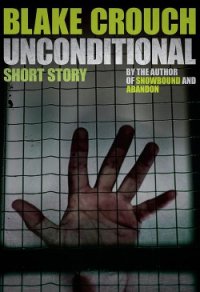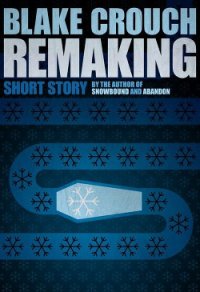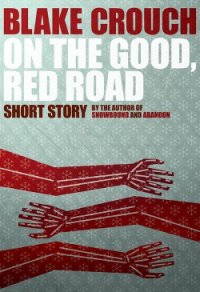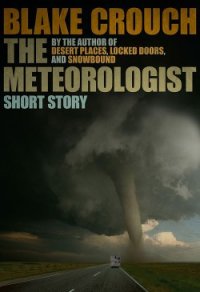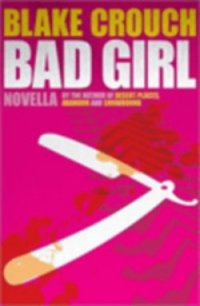Abandon - Crouch Blake (электронная книга TXT) 📗
Ezekiel spent his last thought not on the horror of what might happen to Gloria, or his own inconceivable pain, or all the things he would not ever see or smell or taste again. He spent his last thought on his boy.
The sound of Gus’s laugh.
What it had felt like to cradle him.
The nape of his neck.
With the bore charged, Billy set about fitting a brass cap to the nipple in back of the cylinder.
You was the best thing. You and your mama, and I wished I’d knowed that when I coulda done somethin to preserve it.
Billy waded up to the rock where Ezekiel lay dying, leveled the nine-inch barrel between the man’s eyes. Ezekiel barely heard the hammer thumb back, because the possibility of heaven had dawned on him, and he was thinking how sweet and unexpected a surprise it would be to arrive there after all this, see Gus, sneak up on his boy, tickle his ribs, throw him in the air. And that laugh . . . Please, God, let me hear Gus laugh again if You’re real and have any regard—
THIRTY-THREE
O
Lord God of my salvation, I have cried day and night before Thee. Let my prayer come before Thee.
The preacher lay shivering in a bank of snow at the base of the boulder field, so far beyond those innocuous, eloquent prayers he’d delivered to his congregation on Sunday mornings, beyond the decorum he’d always reserved for addressing his Savior. He could only manage a silent, desperate psalm.
Incline Thine ear unto my cry. For my soul is full of troubles.
In the distance, a horse snorted. Stephen raised his head, saw Oatha Wallace and Billy McCabe loping through the powder on their mounts, leading a train of burros down from the pass.
And my life draweth nigh unto the grave.
Stephen ducked under the bank and burrowed deep into the snow, taking the cape from his black greatcoat and draping it over his head to keep the powder from falling into his collar.
I am counted with them that go down into the pit. I am as a man that hath no strength.
The preacher sat motionless and buried, his back to the snowbank, watching Russell Ilg’s mare wandering between the boulders.
Free among the dead, like the slain that lie in the grave, whom Thou rememberest no more. And they are cut off from Thy hand.
He heard the tinkle of harness bells on the other side of the snowbank, no more than ten feet from where he sat.
Someone said, “Whoa now.”
He envisioned Billy and Oatha tugging at their reins.
“Reckon these are Ezekiel’s?” Oatha’s voice. They were studying his tracks.
“O-o-o-or maybe that horse yonder.”
Thou hast laid me in the lowest pit, in darkness, in the deeps.
“Naw, that horse come from farther up. These here are the tracks of a man.”
Thy wrath lieth hard upon me, and Thou hast afflicted me with all Thy waves.
“I’ll climb down and check it out if ye want, Oatha.”
Stephen closed his eyes.
Mine eye mourneth by reason of affliction. Lord, I have called daily upon Thee, I have stretched out my hands unto Thee.
“They was just the two a them, right?”
“Yeah, I think—”
“Think?”
“Th-th-th—”
“You little stutterin greener, you better—”
“They was just the two a them. I know it for a fact. And we saw the other’ns body back there.”
“Well, all right, then. Naw, don’t get down.”
Oatha clicked his tongue and the pack train moved on. When he could no longer hear the harness bells, Stephen staggered out of the drift and brushed the snow from the wool of his coat.
He stood alone on the mountain, a hundred feet below the pass, listening to the wind and the sound of it pushing grains of snow over the surface like sand skimming a beach. He thought of home in the South Carolina low country, and the memory of it filled him with heartsickness in this frozen desolation.
Stephen found Russell’s horse sheltering itself on the lee side of a giant boulder. He swung up into the saddle, quirted the horse on its snow-matted neck, rode upslope in the tracks of the pack train.
At the Sawblade, the wind blew steady and scaldingly cold.
It had scoured out the snow and built a cornice on the north side, allowing Stephen to dismount onto bare rock.
He followed the burro tracks along an icy ledge. Despite the dizzying exposure, he couldn’t stop himself from peering over. He saw a red crater two hundred feet below—one of the burros had lost its footing, gone over, exploded in the snow like a viscera bomb.
The ledge ended at a recess in one of the jagged spires upthrust from the pass like a rotten canine tooth. He spotted an opening at knee-level in the back wall, a small claim hole just wide enough for a man to crawl through.
Stephen loosed the cloth buttons, reached into his coat. He thought he had a match in one of the pockets, but he didn’t find it.
He approached the hole. It went back four feet, then opened into darkness. He crawled in, wriggled himself through the tapering passageway, then finally emerged, the ground solid beneath his feet, though he had no sense of the chamber’s dimensions.
He extended his right foot. It struck something hard.
He removed his gloves, squatted down, reached forward, his fingers grazing the cold gold, bars and bars and bars of it, stacked upon one another in a cube that rose above his knees.
He lifted one of them, held it to the light that drizzled in through the hole, and as he stood in that semidark, staring down at the chunk of yellow metal, he considered the blood that had already been shed for it and wondered how much more was to come.
He thought of all the people in that haunted town two thousand feet below, how they’d endured this brutal wilderness and all its impositions—the cold, the thin air, the loneliness, maddening isolation—for just a fraction of what he held in his hand.
And in that moment, he no longer regarded the residents of Abandon and the thousand other mining camps scattered like bacteria through the West as people of ambition and courage. They were a cold, dirty, desperate, miserable lot. He saw them now so clearly. They had crossed the plains and made homes in these savage mountains and borne their myriad afflictions not because they were brave pioneers pursuing a dream. They had come for no other reason but that their ravenous hearts raged with greed.
The preacher crumpled down in the cave and wept.
STEPHEN.
At the sound of his name, he went rigid with fear.
THIRTY-FOUR
S
tephen crawled out of the cave and walked back up to the pass.
Above him, the clouds had broken up, beams of afternoon sunlight passing through, bronzing random patches of forest, summits, ice fields with the strongest light he’d seen in days.
The mare stood waiting for him on the windswept rock.
As he reached her and put his foot into the stirrup, he heard it, though owing to the wind, he couldn’t immediately determine from which direction the sound had come. He looked downslope, and with the mist clearing, he could see all the way into the canyon and a line of specks near the Godsend mine—Oatha and Billy and the burros on their way back to Abandon.
He heard it again—a faint howl.
Others joined in, each of varying pitch and duration, like a discordant symphony of owls and geese and baying dogs.
Stephen pulled his foot out of the stirrup and walked to the other side of the pass, stood bracing against the wind, shielding his face with his gloves.
At first, there was little to see. Clouds sailed toward him and over him—mammoth schooners. Fog swirling in the depths below, hiding the long, broadening valley, the lake several miles south, the open country beyond. He’d taken this trail to Silverton once before—much faster than the wagon road, though more dangerous because it required a steep descent along a series of narrow ledges that switchbacked down from the cirque.
